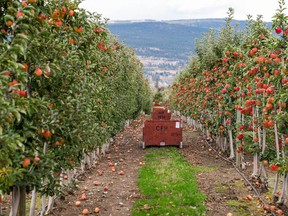
Replanting hardier varieties may not be enough to make B.C.’s orchards and vineyards resilient to climate change

Article content
B.C. fruit growers welcomed an extra $70 million to replant orchards and vineyards damaged by consecutive years of harsh weather — but say it doesn’t alleviate their anxiety over a very uncertain future.
The money, announced Wednesday, is intended to prompt growers to plant “climate-resilient varieties that produce in-demand, premium fruit,” according to a provincial government news release.
Advertisement 2
Article content
Article content
But it’s unclear if those varieties exist for every crop that is threatened.
B.C. growers said it could be difficult to find suitable peach, apricot and grape varieties capable of surviving a minus-27 degree Celsius cold snap, or a rapid 30-degree plunge in temperatures, as the B.C. Interior experienced in early January.
“This program won’t help if you can’t afford to replant and if you don’t have faith in the future,” said Peter Simonsen, a Naramata fruit grower and president of the B.C. Fruit Growers Association.

Simonsen and all the farmers Postmedia spoke to Thursday said they were grateful for the provincial support and were reluctant to criticize the government program. But they also pointed out the significant challenges facing B.C. agriculture due to climate change.
“We need to come up with varieties and better planting methods that are more resistant to climate change,” said Simonsen. “But that’s hard to do when growers are struggling with lack of cash flow.”
B.C. farmers have experienced several tough years in a row, and expectations for the 2024 harvest are low. January’s deep freeze wiped out nearly 99 per cent of this year’s wine vintage and about 90 per cent of the stone fruit crop.
Article content
Advertisement 3
Article content
“I don’t want to be negative,” said Sukhdeep Brar, who grows apples and cherries on a farm in Summerland. “We’re grateful for the $70 million. If we could have had $700 million, that would be better.”
While he was uncertain about how the money will be dispersed, Brar said in the past it has covered a percentage of costs and was capped at 10 acres. Farmers need to pay for the work up front and then pass an inspection before being reimbursed, sometimes several months after planting. That means some may not have the money to take advantage of the program.
Based on rough calculations, Brar estimated grape vines cost about $5 per plant, with about 1,800 planted on an acre of land. Apple trees cost about $10, with 1,600 to 1,800 trees on an acre. Cherry trees are about $19, with 400 trees on an acre. That puts the cost of plants alone between $7,500 and $17,000 an acre, not including the cost of poles, wire and irrigation.
Brar said he was quoted about $200,000 to replant about five acres of apple trees. “It adds up very fast.”

B.C. Premier David Eby, who announced the funding in a virtual address to a wine industry conference in Penticton on Wednesday, said the new funding would help about 1,000 more growers revitalize their farms. The money will be added to the $15-million perennial crop renewal program, launched last spring to help more than 200 farmers replace diseased, deceased and unproductive plants.
Advertisement 4
Article content
“These programs have always been very good in the past,” said Brar. “I’m hoping this year will be the same — no, better, it has to be better, because inflation has made it harder than ever.”
Kelowna farmer Jennifer Deol said she would like to see the money made available to new and small farmers in particular, since she believes replanting vast fields of the same crop is not an adequate response to climate change.
“We have to think about ways to make the industry sustainable,” said the co-owner of There And Back Again Farms.
Farmers should be encouraged to grow multiple crops, so that if one fails, they can pivot, she said. Growing fruits like peaches and apricots may not be as viable anymore.
In a previous interview with The Canadian Press, Miles Proden, president of Wine Growers B.C., said there is worry and even panic in the wine industry given the “steady decline” of grape harvests in recent years.
But many vineyards have been working to adapt to climate challenges, making sure they have “the right grape in the right place.”
“We’re in a good place to reset the vineyard for the future,” he said. “It’s not as though we can’t grow grapes and make wine in B.C. It’s just that with climate change, there needs to be adjustments.”
Advertisement 5
Article content
Recommended from Editorial
With files by Canadian Press
Bookmark our website and support our journalism: Don’t miss the news you need to know — add VancouverSun.com and TheProvince.com to your bookmarks and sign up for our newsletters here.
You can also support our journalism by becoming a digital subscriber: For just $14 a month, you can get unlimited access to The Vancouver Sun, The Province, National Post and 13 other Canadian news sites. Support us by subscribing today: The Vancouver Sun | The Province.
Article content


